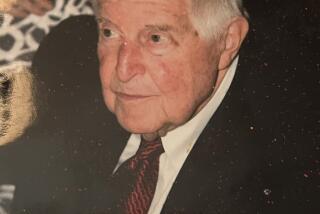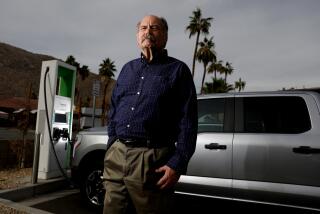Berkeley professor led low-carbon research
- Share via
Alexander Farrell, a UC Berkeley associate professor who was a leading voice in energy and transportation policy and played a key role in drafting the state’s plan for carbon emissions reductions, died last week in his San Francisco home. He was 46.
No cause of death had been determined, and the San Francisco medical examiner was investigating the matter.
Farrell was best known for his work in researching biofuels, plug-in electric hybrid cars and the effect of fossil fuels on climate. Last year, he was chosen by Gov. Arnold Schwarzenegger to co-write the landmark low-carbon fuel standard for the state.
He was widely regarded as a young star in the burgeoning world of academic study into critical issues of energy and transportation, and he had worked with most of the leading lights in the field, as well as with representatives of industry, government and environmental groups. An energetic man, he was admired by colleagues for his attention to detail and open-minded approach to research.
“There’s really no one else around that’s able to do what he was doing,” said Daniel Sperling, head of the Institute of Transportation Studies at UC Davis, who worked closely with Farrell as co-author of the low-carbon fuel standard and knew him for more than a decade. “This is really a big loss.”
Farrell was born in Miami on Jan. 1, 1962, and raised in New Jersey. He graduated from the U.S. Naval Academy in 1984 with a degree in systems engineering. For five years, he worked as an engineer on nuclear submarines, then worked in the private sector before attending the University of Pennsylvania, where he earned a doctorate in energy management and policy.
He did postdoctoral work at the American Assn. for the Advancement of Science and at Harvard University’s John F. Kennedy School of Government, then in 1998 joined Carnegie Mellon University.
In 2003 he was recruited to UC Berkeley’s Energy and Resources group by professor Dan Kammen. The two worked closely on a number of projects, including groundbreaking research on biofuels that shattered long-held beliefs about the viability and environmental effect of combustibles such as corn-based ethanol.
In 2006, he was granted tenure and was named director of the university’s Transportation Sustainability Research Center.
Farrell and Kammen co-authored numerous papers in the field, and Kammen admired Farrell’s thoroughness and attention to detail. “Alex was very much involved in looking at the nitty gritty,” Kammen said. “He was very much a person who went where the numbers told him to go.”
Farrell published dozens of peer-reviewed papers in academic journals including Science, Energy Policy and Environmental Science & Technology. He also taught mostly graduate-level courses.
Throughout his career, he was known for his collaborations with others and his frequent dialogues with experts from beyond academia on his research.
Roland Hwang, director of vehicles policy at the Natural Resources Defense Council, worked with Farrell to develop the low-carbon fuel standard, visiting both Sacramento and Washington to brief lawmakers.
“Alex was quite remarkable,” Hwang said, praising Farrell’s open-minded approach to policymaking and willingness to incorporate differing ideas into his work. “It’s going to be very difficult to find anyone like him. His contributions were tremendous, not just scientifically, but as a person. He did so much to bring together different groups.”
Last year, Farrell joined the Roundtable on Sustainable Biofuels, and he recently released a report on plug-in hybrid electric vehicles.
Farrell is survived by his mother, Alice Farrell of Harrisburg, Pa.; two brothers, Mark of Portland, Ore., and Brian of Portland, Maine; and his sister, Beth Ann Connolly of Harrisburg.
“He was one of the brilliant young guys around, doing great work,” Sperling said.
--






